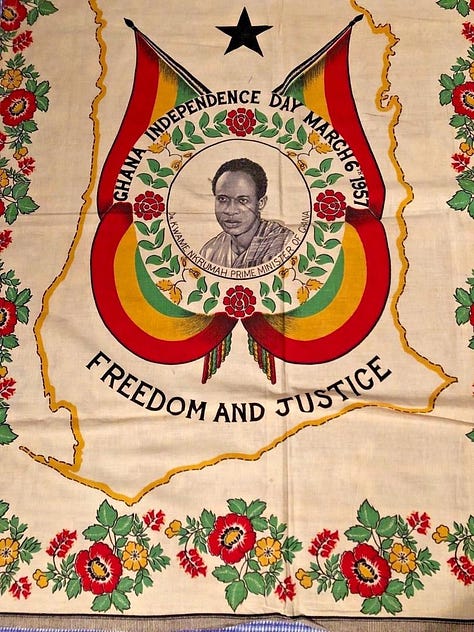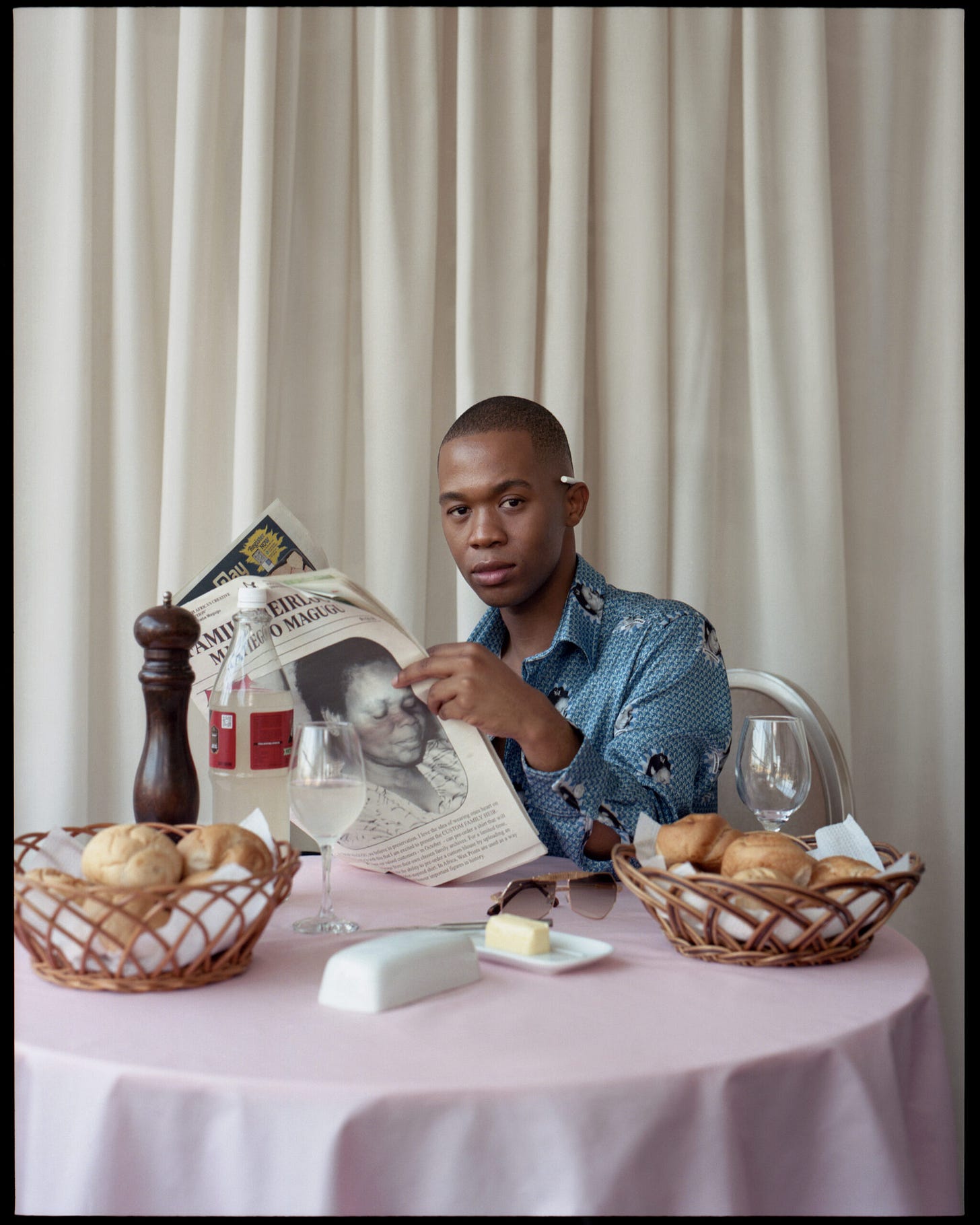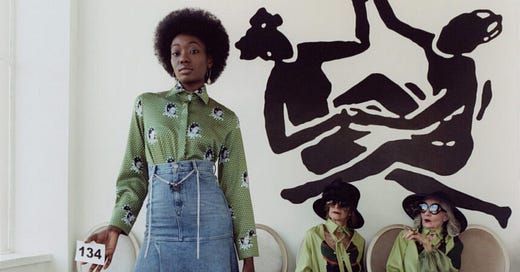Thebe Magugu's Postcolonial Take on Luxury
Magugu's Custom Heirloom Shirt is an exploration of textile history, community-centred design and the intersection of African heritage and modern luxury.
The piping hot take that quiet luxury is anti-Black has been done to death, but bear with me. There's a really great interview with Schiaparelli’s artistic director, Daniel Roseberry, where he states that in luxury fashion, “design, vision, and artistic statement have been sort of commandeered by marketing plans and the bloat of multibillion-dollar business.” Today, luxury is often associated with exclusivity and restrictions—it’s quiet because it deliberately excludes, adopts minimalism to promote scarcity, and leaves many with less. Which brings me to Thebe Magugu's Heirloom Shirt, which draws on the African tradition for commemorative cloth and showcases a celebration of craft and community that I think better represents what luxury can and should be
.
I read something (or maybe I saw a TikTok) about how the story of Africa is told through cloth. There's a quote I'm constantly referencing by Ghanaian artist, El Anatsui: “Cloth is to the African what monuments are to Westerners.”
Commemorative cloth (also referred to as portrait cloth), used in Magugu's Heirloom Shirt, is the most obvious example of this, which roller prints portraits and messages onto cotton to celebrate and document important milestones and events as well as the election or inauguration of leaders and heads of state. It involves roller printing portraits and messages onto cotton to commemorate important milestones, events, or the election of leaders. It holds significant cultural value in the context of African liberation. One of the earliest and most well-known instances was created for Kwame Nkrumah following Ghana's independence from Britain in 1957—a black and white portrait of Nkrumah was printed on green cotton, surrounded by black stars and the inscription "freedom and justice." Similar designs were created to mark Nelson Mandela's release from prison in the early '90s.
There are many more examples and they're not limited to African presidents and struggle heroes; I've seen ones with Barack Obama, Princess Diana, and Michael Jackson.



For Magugu, it's his late grandmother, Matiego Magugu, on a shwe-shwe inspired background and now, for you, it could be anyone you want. From 6 October 2023, the label's allowing customers to make their own interpretations with the ability to customize the shirt with a portrait from their own archives.

"You can choose to honour and memorialise anyone who has left an impact on you - living or transitioned, blood or chosen”, says Thebe Magugu via the label's Instagram. “As you know, Wax Prints often have important historical figures printed all over them. However, I think so many times, history and its figures have always been imposed onto us, and I love the idea of taking back and empowering others to fashion their own history with their own key figures.”
If there was ever a thesis statement on African fashion, I think it would be that. In Africa Fashion (2022), Christine Chisenka speaks about the political and transformative power of print, headwraps and dashikis in the 20th century, “The fashions being worn allowed us to show ourselves to the world as we knew ourselves to be: individuals with diverse beliefs, values, styles and identities.” It's a rather postcolonial approach, combining culture, heritage, decolonisation and the complicated hybridity of modern life as an assertion of power, reclamation and sheer beauty.
And, yes, there are many luxury designers, both African and non-African, that imbue their clothing with a mission statement or artistic vision, but what makes African luxury compelling is the community aspect. It's the way that our clothing can be a living history, not just through the figures and events we place on them but how these items can belong to everyone.
In Book Club this week we went through Vogue Portugal's Lucky Issue, which examines superstition, talismans and fortune through dress—think: a lucky bracelet, a Jesus piece, or your emotional support tote bag. Magugu discussing his first shirt, “Wearing it makes me feel protected and watched over by her, and I hope our customers choose subjects based off of emotional connection, because that is the function of a charm - a physical part representing a metaphysical whole,” reminded me of our own discussion on how clothing can carry energy.
We cleanse thrifted items or letting go of things from a bad time. But we also got into how our new clothes could carry the vibes from the people making them like the stress of a sweatshop worker or a woman whose been handwaving kente her whole life, passing down decades if not centuries of heritage and culture in something we get to live in every day.
Of course, it does feel a little bit weird to wax poetic about community and belonging when discussing a shirt that retails for R7,500.00—that's the kind of the exclusion and limitation I've just bemoaned typical luxury for but I think there's a value in at least being able to take part in a story even if the purchase is (very) out of reach.
If I look at quiet luxury, I know that there are so many cues and symbols I will never understand because they're specifically designed to keep people like me out. There's a world of imported diamond encrusted caviar and t-shirts made from the embryos of endangered silk worms invisible to me because Silicon Valley tech-bros and the descendants of Prussian nobility have learned their lessons from the French Revolution. These instances where contemporary African designers bring together heritage and culture feel a lot more open and inviting, even with those 4-figure price points, because the beauty of it doesn't start and end with who it leaves out.
You know you love me xoxo
Khensani





